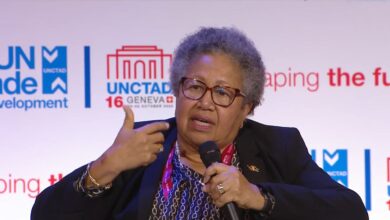(CARICOM Secretariat, Turkeyen, Greater Georgetown, Guyana) Despite efforts at the national, regional and international levels, exotic pests continue to invade the Caribbean and the impact on trade can be both harmful and devastating.
This was the message from Senator the Honourable Arnold Piggott, Trinidad and Tobago’s Minister of Agriculture, Land and Marine Resources when he addressed delegates on the opening day of a three-day symposium on invasive species in St. Kitts/Nevis on Tuesday. The annual symposium, sponsored by the United States Department of Agriculture (USDA) Tropical and Subtropical Agriculture Research (T-STAR), brings together policy makers and scientists working in the area of invasive species, predominantly plant pests.
Minister Piggott said countries needed to ensure that the necessary measures were always in place to contain, control and where possible prevent the entry of invasive species within their borders. Keeping out invasive species would, however, pose increasing challenges in a liberalised trading environment, he pointed out, since there were several avenues that allowed for the movement of invasive species.
“Keeping out or managing alien invasives will present even greater challenges as we further liberalise and expand trade. New trading arrangements such as the EPA and the CARICOM Single Market and Economy will further test resilience, as we struggle to comply with existing trading agreements, such as WTO,” said Senator Piggott.
“We have no control over invasions by transboundary species, which can spread by wind, water and other natural phenomena, and keeping them out could indeed be an enormous task. But, by and large many invasive species come through our various ports of entry. These we can keep out by strengthening our quarantine systems. Dedicating more resources, improving our legislative framework, training and enforcement can do this. We can also intensify our surveillance systems for early detection, eradication or management,” he added.
He emphasised that the impact of invasive organisms on trade can be quite costly and very devastating.
“The moment one country announces the presence of an invasive species; it can expect some sort of immediate trade embargo, even when non-host species are traded. In many cases steps to be taken for restoration of trade can be quite costly. It invariably involves research to develop treatment protocols (for export) that satisfy all parties, travel and inspections to declare pest-free status and the costs of implementing other management strategies,” the Minister informed the audience.
Senator Piggott underscored the need for the management of invasive species through multi-dimensional, short-term and long-term approaches.
He added that the strategies should be aimed at: increasing awareness and improving understanding of the impact of invasives on agriculture, biodiversity, ecosystems and trade; recognizing that invasive species should always be treated as a priority issue requiring national and international action to prevent their entry; minimizing the intentional introduction of invasives; and evaluating the risks of deliberate introductions such as biological control agents, in advance.
He also listed other strategies such as: encouraging the development of action plans to eradicate or manage these invasives and encouraging the development and implementation of national legislation and international cooperation to regulate the introduction, eradication or management of invasives that may manage to get in.
Editor’s Note: “Invasive species” means an alien species whose introduction does or is likely to cause economic environmental harm or harm to human health.
“Alien species” means, with respect to a particular ecosystem, any species, including its seeds, eggs, spores, or other biological material capable of propagating that species, that is not native to that ecosystem.





